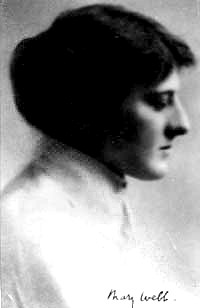Mary Gladys Webb
Mary Webb (born on 25. March 1881 as Mary Gladys Meredith in Leighton , Shropshire , died on 8. October 1927 in St Leonards-on-Sea , Hastings ) was an English writer and poet. Her most famous and multiple filmed novel was Precious Bane ( Precious Poison ).
Life
Mary Meredith was the child of the teacher George Edward Meredith and his wife Sarah Alice. She grew up in Much Wenlock in rural Shropshire, the landscape her later writing focused on. Mary Meredith finished school in Southport from 1895 while the family moved several more times within Shropshire.
In 1901 Meredith fell ill with the autoimmune disease Graves syndrome and has since suffered from fragile health, which is why she increasingly sought refuge in literature. In 1907 her brother Kenneth Meredith published a first poem in a local newspaper without her knowledge, which, to her surprise, received a positive response. In 1912 she married the teacher Henry Bertram Law Webb. Despite the first success of the debut novel The Golden Arrow , which she completed in 1916, there was no lasting prosperity in the young marriage, which broke up in the twenties. She died single in St. Leonards on Sea and was buried in Shrewsbury .
Work (selection)
Webb's novels have been praised for their descriptions of nature and psychological portraits, which are more successful than those of their contemporary Thomas Hardy . Their mystical interweaving of Celtic and Christian heritage was also highlighted.
- The Golden Arrow (1916, German: The Golden Arrow )
- Gone to Earth (1917, German: Heim zur Erde )
- The spring of joy; a little book of healing (1917)
- The House in Dormer Forest (1920, German: Das Haus im Dormerwald )
- Seven For A Secret; a love story (1922, German: Seven for a secret )
- Precious Bane (1924, German 1926: Precious Poison )
The tragic and fatalistic component of the books, coupled with a Shropshire local patriotism, however, also aroused resentment, for example from the reviewer Stella Gibbons , who brought out the successful parody Cold Comfort Farm in 1932 and targeted elements from Webb's novels.
Film adaptations
- Gone to Earth , 1950. (Director: Michael Powell . Starring Jennifer Jones as Hazel Woodus. Restored 1985.)
- Precious Bane , 1957 BBC six-part series. (Starring: Patrick Troughton and Daphne Slater .)
- Sarn (French translation by Precious Bane ), 1968. (Director: Claude Santelli . Leading roles: Dominique Labourier as Prue, Josep Maria Flotats as Gedeon and Pierre Vaneck as Kester.)
- Precious Bane , adapted from the BBC in 1989. (Starring: Janet McTeer as Prue, Clive Owen as Gideon and John Bowe as Kester.)
Awards and honors
- The village school in Pontesbury , Shropshire, was named after her in 1957.
- Prix Femina Étranger 1925
Individual evidence
- ↑ a b c Antonius Lux (ed.): Great women of world history. A thousand biographies in words and pictures . Sebastian Lux Verlag , Munich 1963, p. 492.
- ↑ The Guardian Literature Review : Mary Webb: brighter and better than Thomas Hardy . (engl.)
| personal data | |
|---|---|
| SURNAME | Webb, Mary Gladys |
| ALTERNATIVE NAMES | Webb, Mary; Meredith, Mary Gladys |
| BRIEF DESCRIPTION | English writer |
| DATE OF BIRTH | March 25, 1881 |
| PLACE OF BIRTH | Leighton , Shropshire |
| DATE OF DEATH | October 8, 1927 |
| Place of death | St. Leonards-on-Sea , Hastings |
